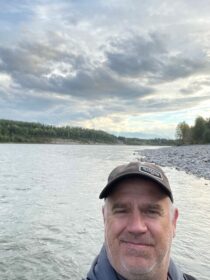Water Engagement Initiative
The Water Engagement Initiative is an inclusive public process, where interests are shared to improve water management in the Nechako River.
The Water Engagement Initiative (WEI) is led by independent facilitators and supported by technical specialists to identify opportunities to better address multiple interests related to Rio Tinto’s operations. Together, we are identifying changes to our operations that better reflect a broad range of community interests.
Since June of 2019, through broad based engagement, approximately 40 individuals have been actively participating in the WEI, sharing a wide range of interests, issues and concerns spanning three geographic areas: the Nechako Reservoir, Skins-Cheslatta-Murray Lake system, and the Nechako River.
You can read our latest update here.
Timeline
Step 1 (2017)
Pre-engagement on methods and topics for the water engagement
Step 2 (January – March 2018)
Report out on Step 1 and develop plan for focused Water Engagement Initiative.
Step 3 (March – July 2018)
Launch search for independent facilitator (EDI Environmental Dynamics Inc. selected)
Step 4
Broad based engagement to gain an understanding of interests to be addressed. Includes public meetings, small group workshops and one on one dialogue.
Step 5
We are here! This step focuses on the development of options to address interests raised in Step 4.
Step 6 (Future stage)
Report back and present draft options for further refinement. Includes public meetings, small group workshops and one on one dialogue.
Step 7 (Future stage)
Finalise options and develop implementation plan, including regulatory approval where required.
Meet our team of technical specialists:

Jayson Kurtz
Registered Professional Biologist
Jason is a Registered Professional Biologist with over 25 years’ experience in fisheries and aquatics sciences in both private consulting and government. He is well versed in resource management planning with industry, Indigenous Groups, government, and other stakeholders. Mr Kurtz has several years’ direct experience in Water Use Planning; he was the DFO representative on 8 BC Hydro WUPs in the Southern Interior and Peace Regions. In that role, he helped develop, author and edit various action plans and technical studies, specifically using adaptive management and value-based Structured Decision Making. Jayson’s Water Use Planning and general hydroelectric experience provides him with a broad understanding of environmental/ecological, social/cultural, and operational issues regarding hydroelectric facilities and river flow regulation. Mr Kurtz first worked on the Nechako River in 1994, electrofishing juvenile chinook salmon as part of the Nechako Fisheries Conservation Program, and has since broadened his experience and knowledge of the Nechako watershed and Rio Tinto operations from his employment with DFO (Prince George) and Ecofish (Terrace). Jayson has extensive experience working with Indigenous Groups, having participated in consultation, community engagement and knowledge-holder interviews, and is familiar with Indigenous and public interests and concerns regarding the Nechako watershed. Document Library
Filters
2025 DEP Inundation Maps
2024 BC Works Communities and Social Performance Report
WEI Main Table Meeting #34
WEI Phase 1 Final Report: December 2024
This report provides a summary of Phase 1 of the Water Engagement Initiative.
WEI Meeting #33 / Check-In
Communities and Social Performance Reports
Guided by our Communities and Social Performance (CSP) Standard, Rio Tinto BC Works is focused on building trust through open and honest dialogue, active local and regional partnerships and a long-term commitment to sustainable development. A key part of our commitment is being transparent about our operations.
WEI Meeting #32 & #32.5
Technical Memos to Support Issue Scoping and Performance Measure Development
Nechako Drought Conditions: FAQ
Sustainability Update (2022) Released
BC Works has released its 2022 Sustainability Update that highlights our contributions to the local and BC economy, our community investments, our environmental and biodiversity performance and more.
Our approach to sustainability is guided by Rio Tinto’s purpose: finding better ways to provide the materials the world needs. In 2022, many of our investments were focused on assisting the low-carbon transition, as well as our of being the best possible partner to our host communities.
WEI Meeting #31
WEI Meeting #30
WEI Meeting #29
Technical Memos to Support Issue Scoping and Performance Measure Development
WEI Meeting #28
Community Presentations
As part of Rio Tinto BC Works’ commitment to transparency about its operations, the Rio Tinto watershed team meets frequently with community leaders and stakeholders to provide updates about reservoir operations and other pertinent matters. Presentations are posted here for all to view.
WEI Meeting #27 Documents
Southside Working Group
WEI Meeting #26 Documents
6 April, 2022 Meeting
Dam Emergency Plan and Inundation Maps
As part of our commitment to safety and in adherence with regulatory requirements, Rio Tinto BC Works has prepared a Dam Emergency Plan (DEP). The DEP was developed with input from first responders, technical experts and stakeholders, among others, and provides detailed information regarding the potential flooding impacts downstream of the Nechako Reservoir to assist downstream communities prepare emergency response plans, as per BC Dam Safety Guidelines. This document has been shared with relevant authorities, and is available to all interested parties. You can also access individual inundation maps
Water License / Operating Agreements
Agreements and a water licence govern the management of the Nechako Reservoir, along with regulatory requirements.
WEI Meeting #25 Documents
January 26, 2022 WEI Meeting
WEI Meeting #24 Documents
24 November 2021